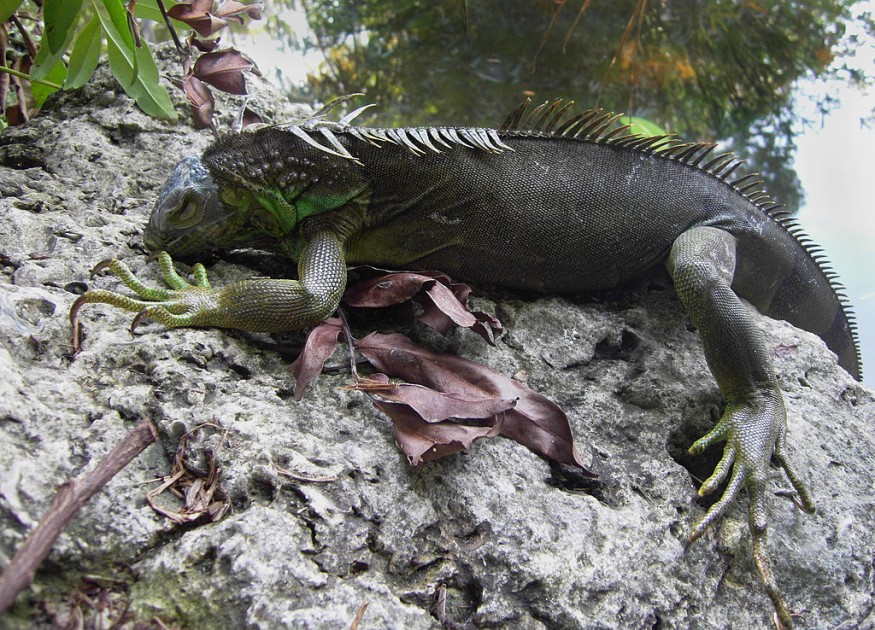
This is the time of year when Florida experiences chilly winter weather, causing frozen iguanas to tumble from trees.
Winter is Frozen Iguana Season in Florida
As temperatures drop in Tampa Bay and South Florida, something unusual occurs with iguanas. In northern states, falling leaves signal winter, but in Florida, frozen iguanas fall from trees. When it gets cold, iguanas freeze and drop from their perches.
The Florida Fish and Wildlife Conservation Commission states that below 50 degrees, iguanas slow down, falling in the 40s and 30s. While they may appear lifeless, it's wise not to bring them indoors because they'll revive when temperatures rise. So, despite their temporary immobility, it's best to let the green reptiles be as the seasons change in Florida.
Humane Killing
When residents encounter a stunned iguana, they have the option to humanely euthanize the animal, as recommended by the FWC. In suburban environments where iguanas are frequently found, it's cautioned against shooting them. William Kern Jr., an Associate Professor of Urban Entomology at the University of Florida, emphasized that while firearms are effective for iguana harvest in Central and South America, using firearms nor pellet rifles in South Florida's suburban areas, where iguanas pose issues, is neither legal nor safe. Shooting is discouraged.
Employing a bow with tethered fishing arrows may be legally permissible, but the ethical aspect is open to debate. Individuals are advised to consult local Florida Fish and Wildlife Conservation Commission officers or law enforcement before using any projectile weapon. Slingshots with small projectiles or palm fruits can serve as useful harassment tools but should only be operated under adult supervision with a secure backstop. Scientists have used rubber band guns to temporarily stun juvenile iguanas for manual capture.
Irrespective of the chosen method, ensuring the immediate loss of consciousness is crucial, as specified on the FWC's website. Subsequently, "pithing" is employed to destroy the animal's brain, preventing it from regaining consciousness.
Disposing of Dead or Humanely Killed Iguana
For individuals who have killed an iguana but don't intend to consume it, it's crucial to consult their city's regulations before disposing of the reptile to avoid potential fines. Tossing a dead iguana on the road or in waterways can also result in penalties. Those planning to consume iguana meat should do so cautiously, as the animal's meat and eggs, considered delicacies in some regions, can pose health hazards.
Iguanas primarily feed on plants and fruits in landscaped areas, which are frequently treated with pesticides, amplifying the risk. Therefore, exercising caution is essential when consuming iguana products due to potential pesticide contamination.
Also Read : 5 Times in History That Frogs Fell From the Sky
Dealing with Live Iguanas
In Florida, captured iguanas cannot be relocated and released elsewhere. If you lack the expertise to remove iguanas from your property safely, it's advisable to enlist the assistance of a professional wildlife trapper. To possess live captured green iguanas for eradication and control purposes, a permit is mandatory.
Escaped or released pets continue to be a significant source of introduced species in Florida, despite the illegality of introducing non-native species into the state. To keep pet green iguanas acquired before the rule's effective date, a permit is now required.
The FWC's Exotic Pet Amnesty Program offers a solution for pet owners unable or unwilling to care for their exotic pets, including green iguanas. Surrendering them entails no questions or penalties, irrespective of their legal status. Surrendered pets are adopted by pre-qualified individuals with the necessary permits. This program reduces the release of non-native species by promoting responsible pet ownership and ethical alternatives to releasing exotic animals into the wild.
Related Article : Arctic Blast Makes Frozen Mexican Bats Fall From the Sky in Texas
© 2025 NatureWorldNews.com All rights reserved. Do not reproduce without permission.





